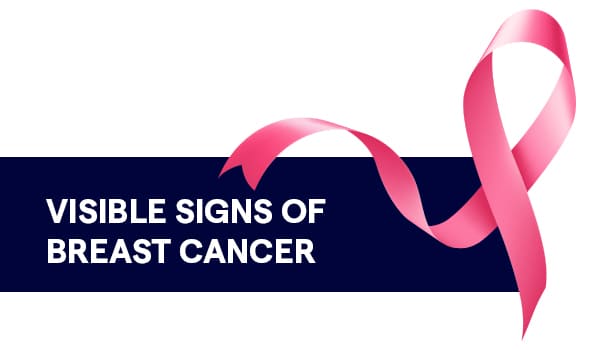
There are a range of breast cancer symptoms that may vary from person to person. A common and seen breast cancer symptom is a lump(in different sizes) in the breast tissue. This lump may feel hard or dense and may be painless. However, not all lumps in the breast are cancerous, and many benign (non-cancerous) conditions can also cause lumps or changes in the breast tissue. A few other symptoms of breast cancer include changes in the size and shape of the breast & skin problems such as redness, swelling, or dimpling, nipple changes such as inversion or discharge, and pain or tenderness in the breast or nipple.
In some cases, breast cancer may also cause symptoms in other parts of the body, such as bone pain or unexplained weight loss. Other conditions may cause these symptoms, and experiencing one or more of them does not automatically indicate the presence of breast cancer. In addition to these symptoms, some people with breast cancer may also experience emotional or psychological symptoms such as anxiety, depression, or fear. Breast self-examination is considered the most effective method of early detection of breast cancer. The steps are as follows:
Steps of Breast self-examination
Age, family history, genetic mutations (e.g., BRCA1 and BRCA2), hormonal variables (e.g., early menstruation, late menopause, hormone replacement treatment), and lifestyle factors (e.g., alcohol intake, obesity, and lack of physical exercise) are risk factors for breast cancer. Additionally, women with a family history of breast cancer may be at a higher risk of developing the disease themselves.
It is recommended that women must start screening for breast cancer at the age of 40 and continue to get screened once a year. This is because the chances of breast cancer increase with age. Regular mammograms & clinical breast exams can detect breast cancer at an initial stage when it is most treatable. It is important to discuss with your doctor the estimated age at which to start screening based on your factors and medical history. By staying up to date with breast cancer screening, women can take proactive steps towards maintaining good breast health and detecting any potential issues at an early stage. In addition to clinical breast exams and breast self-exams, high-risk women may benefit from MRI scans as part of their screening process for detecting breast cancer.
If screening test results or symptoms such as nipple discharge, breast size or shape changes, or the presence of a lump raise suspicions of breast cancer, further testing will be done to confirm the diagnosis. A little sample of tissue is removed from the breast region during a breast biopsy to look for cancer cells under a microscope and determine whether or not they are present.
After confirming a diagnosis of breast cancer, treatment plans are tailored based on factors like the cancer type, stage, and the individual's health status and preferences, with options including surgery, radiation therapy, chemotherapy, hormone therapy, and targeted therapy. The best treatment options for breast cancer may include surgery lumpectomy or mastectomy), radiation therapy, chemotherapy, hormone therapy, and targeted therapy.
Recent advancements in breast cancer treatment include targeted therapies that focus on specific genetic mutations or proteins driving cancer growth, offering more precise and effective treatment options from the best radiation oncology hospital in Delhi.
Adopting a healthy lifestyle with proper nutrition diet, regular exercise, stress management, & avoiding tobacco and excessive alcohol intake not only promotes overall well-being but also plays an important role in cancer treatment. These lifestyle changes can help improve the body's ability to fight off cancer and reduce the risk of recurrence.
If you are concerned about your breast health or have any questions about breast cancer, we encourage you to book an appointment with Sir Ganga Ram Hospital. Our team of doctors is here to guide you through breast cancer screening and help you practice breast self-examination.